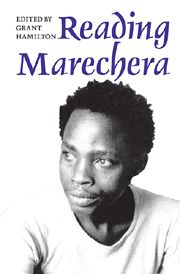Book contents
- Frontmatter
- Contents
- Notes on Contributors
- Introduction
- 1 A Brotherhood of Misfits
- 2 Blowing People's Minds
- 3 Grotesque Intimacies
- 4 Tracing the Stain in Marechera's ‘House of Hunger’
- 5 Menippean Marechera
- 6 Black, But Not Fanon
- 7 The Avant-Garde Power of Black Sunlight
- 8 Classical Allusion in Marechera's Prose Works
- 9 Revisiting ‘The Servants' Ball’
- 10 Marechera, the Tree-Poem-Artifact
- Bibliography
- Index
7 - The Avant-Garde Power of Black Sunlight
Radical Recontextualizations of Marechera from Darius James to China Miéville
Published online by Cambridge University Press: 05 April 2013
- Frontmatter
- Contents
- Notes on Contributors
- Introduction
- 1 A Brotherhood of Misfits
- 2 Blowing People's Minds
- 3 Grotesque Intimacies
- 4 Tracing the Stain in Marechera's ‘House of Hunger’
- 5 Menippean Marechera
- 6 Black, But Not Fanon
- 7 The Avant-Garde Power of Black Sunlight
- 8 Classical Allusion in Marechera's Prose Works
- 9 Revisiting ‘The Servants' Ball’
- 10 Marechera, the Tree-Poem-Artifact
- Bibliography
- Index
Summary
This chapter is about the radicalism of avant-garde writing under globalization. It links the writing of British Marxist fantasy novelist China Miéville and African-American performance artist Darius James with Dambudzo Marechera's novel Black Sunlight, which both authors have named as a specific influence. It does so in order to explore the capacity of literature to reflect upon the politics of globalization and initiate dissent. My argument follows on from Michael Hardt and Antonio Negri in Empire, which argues that the culture of postmodernity and the economic system of the world market mutually support one another, constituting the dominant ideology of globalization.
For Hardt and Negri, Empire is a new social formation which takes the whole world as its territory; a system which allows multiple meta-narratives to interpenetrate and coexist by regulating and managing the ideological conflicts of workers and interest groups economically and socially. It does this economically by differentiating blocks, regions, nations and locales, and sectors such as public and private, within the overarching world market, and socially by differentiating nationalities, ethnicities, regional, gendered and sexual identities, and political affiliations, within an overarching global culture of postmodernity.
Empire argues that this system favors particular economic regions directly at the expense of others by reproducing the economic conditions which enrich more dominant nations and impoverish less dominant ones, simultaneously reproducing cultural forms which naturalize these economic conditions as logical consequences of globalized trade.
- Type
- Chapter
- Information
- Reading Marechera , pp. 120 - 144Publisher: Boydell & BrewerPrint publication year: 2013



